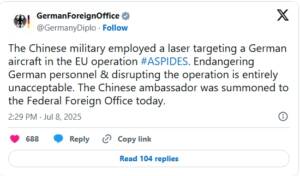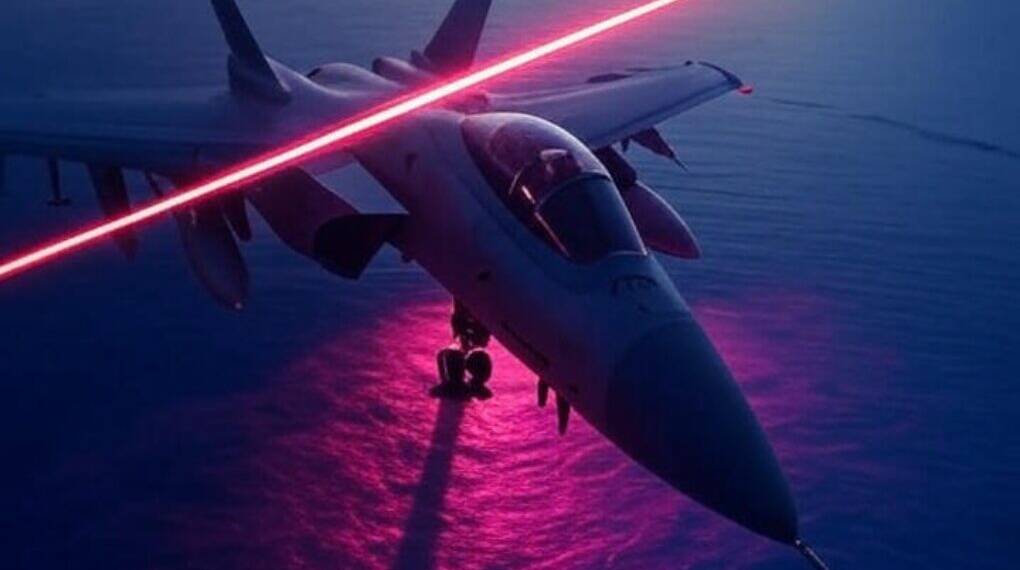On July 8, 2025, Germany issued a stern condemnation, alleging that the Chinese military targeted a German aircraft with a laser during a security mission in the Red Sea. The incident, described as “entirely unacceptable” by the German Foreign Office, occurred while the aircraft was deployed as part of the European Union’s Operation Aspides, a mission aimed at safeguarding maritime security amid ongoing Houthi attacks on shipping lanes.
In response, Germany summoned Chinese Ambassador Shi Mingde to register a formal protest, signaling a significant diplomatic escalation.

The German Foreign Office’s statement, shared on X, highlighted that a Chinese vessel was responsible for the laser targeting, raising concerns about the safety of German personnel and the integrity of the EU mission. This event adds a new layer to the complex geopolitical dynamics in the Red Sea, a region already strained by conflict and competing international interests.
Contextualizing the Accusation
Operation Aspides, launched by the EU in February 2024, seeks to protect commercial shipping from Houthi drone and missile attacks, which have disrupted global trade routes since the escalation of the Israel-Hamas conflict.
Germany’s involvement underscores its commitment to European maritime security, but this incident suggests an emerging challenge from China, whose naval presence in the region has grown. The mention of a Chinese frigate, such as the Jiangkai-class Hengyang spotted off Australia’s coast in February 2025, hints at Beijing’s expanding military reach, potentially extending to the Red Sea via its base in Djibouti.
China’s official response remains absent as of this writing, but the timing—coinciding with heightened Western scrutiny of Beijing’s support for Russia’s war economy—adds fuel to the fire.
Recent EU statements, including comments from Ursula von der Leyen accusing China of enabling Russia, suggest a broader context of deteriorating relations. If confirmed, the laser attack could be interpreted as a deliberate assertion of Chinese influence or a miscalculation with serious repercussions.
Analyzing the Claims
The German accusation rests on the assertion that a Chinese military vessel used a laser to target its aircraft, a claim supported by the swift diplomatic action of summoning Ambassador Shi Mingde. Lasers, capable of disrupting sensors or causing temporary blindness, are not uncommon in military contexts, but their use against a NATO member’s assets in an EU-led mission is unprecedented in this theater.
The German Foreign Office’s public outrage and the summoning of the ambassador lend credibility to the report, yet critical questions remain unanswered.
First, what evidence substantiates the claim? Without independent verification—such as footage, sensor data, or third-party observations—the narrative hinges on Germany’s word against China’s silence. Historical precedents, like Russia’s alleged use of lasers against U.S. pilots in 2018, suggest such tactics are plausible, but proof is essential to avoid escalation based on misinterpretation.
Second, was the laser intended to harm or merely to warn? The distinction could shift this from an act of aggression to a provocative signal, though either scenario justifies Germany’s protest.
Skepticism is warranted given the geopolitical stakes. China might argue the incident was accidental or a defensive response to perceived provocation, especially if the German aircraft was near Chinese naval assets.
The Red Sea’s crowded waters, with U.S., EU, and now potentially Chinese forces, increase the risk of misunderstandings. Conversely, Germany’s prompt action could be a strategic move to rally EU support against China amid broader tensions, including trade disputes and Russia’s war.
Implications and Broader Context
This incident, if verified, marks a dangerous escalation in the Red Sea, a critical artery for global trade. The Houthi attacks, backed by Iran, have already strained international coalitions, and China’s alleged interference could complicate efforts to maintain stability.
Experts are linking this to China’s support for Iran and Russia, though such sentiments are inconclusive without official corroboration. The EU’s Operation Aspides, designed to counter Houthi threats, now faces a new adversary, potentially forcing a reevaluation of its mandate and resources.
Diplomatically, the summoning of Ambassador Shi Mingde signals Germany’s intent to hold China accountable, but it risks a tit-for-tat response. Beijing could retaliate with economic measures or escalate its naval presence, further polarizing East-West relations.
The EU’s tougher stance on China, as voiced by von der Leyen, suggests this incident could galvanize a unified European response, though internal divisions—particularly from nations reliant on Chinese trade—may temper action.
Strategically, this event highlights the Red Sea’s transformation into a proxy battleground. China’s Djibouti base, established in 2017, positions it to project power across the Indian Ocean and beyond. If its navy is indeed targeting EU missions, it challenges the West’s dominance in maritime security, aligning with Beijing’s broader Belt and Road ambitions. Yet, without concrete evidence, this remains speculative, and the establishment narrative of Chinese aggression must be weighed against the possibility of mutual miscalculation.
Opinion: A Call for Transparency and Restraint
The German accusation against China is a serious charge that demands rigorous investigation. While the timing and context—amid Houthi attacks and EU-China tensions—lend plausibility, the lack of transparent evidence risks turning this into a geopolitical football.
Both sides have incentives to spin the narrative: Germany to assert leadership within the EU, and China to deflect criticism of its global posture. Independent verification, perhaps through NATO or UN channels, is crucial to prevent escalation.
The “entirely unacceptable” label is justified if the laser posed a direct threat, but diplomacy should prioritize de-escalation over confrontation. China’s growing naval footprint is a reality, but so is the West’s military presence in the region.
This incident underscores the need for clearer rules of engagement in contested waters. Until more facts emerge, both Germany and China should exercise restraint, lest a single laser beam ignites a broader conflict in an already volatile region.
The Red Sea’s strategic importance cannot be overstated, and any escalation risks disrupting global supply chains further. As the investigation unfolds, the international community must demand transparency to separate fact from propaganda, ensuring that security missions like Operation Aspides can proceed without becoming pawns in a larger power struggle.







